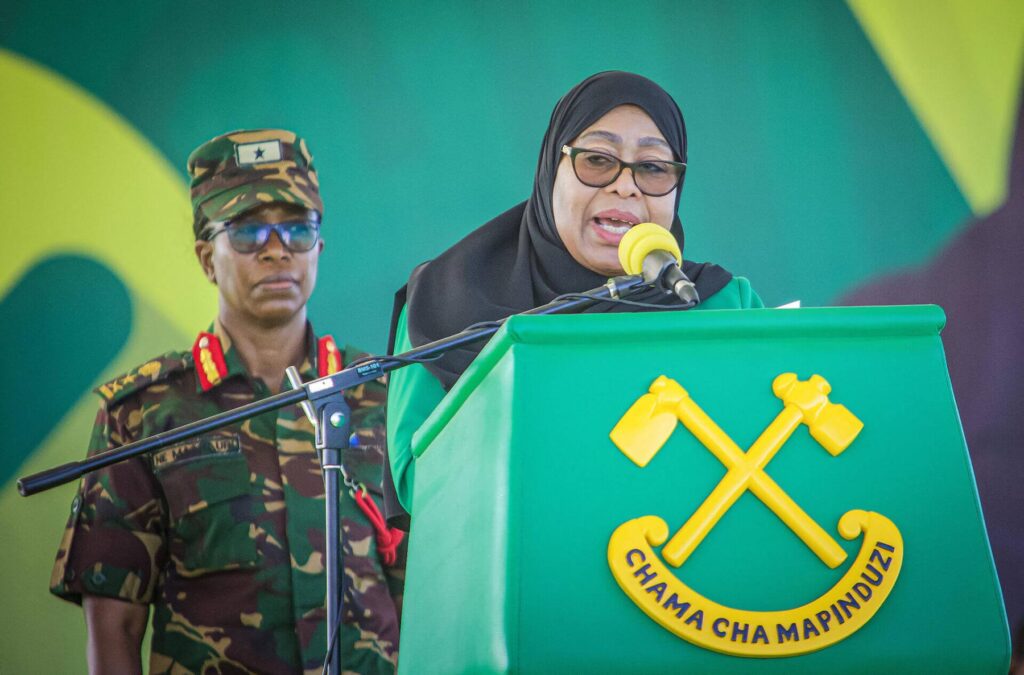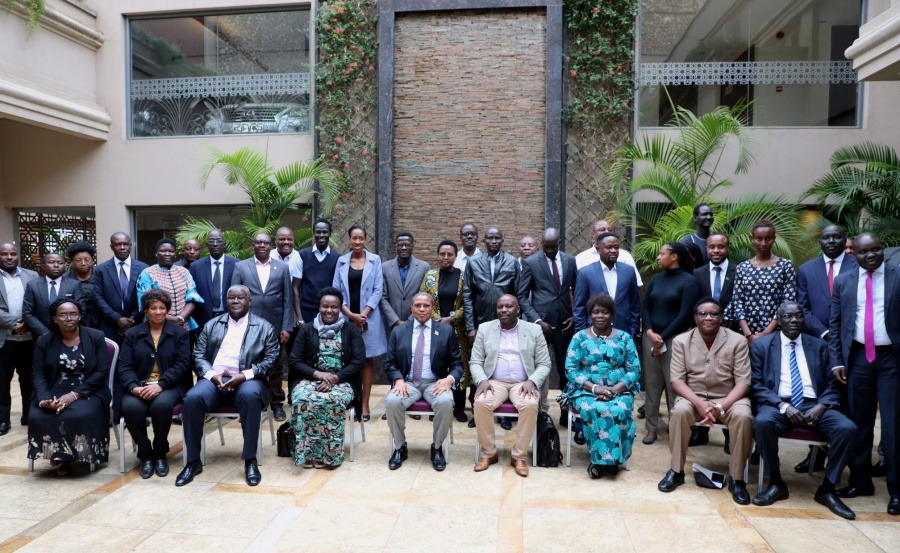
1.0 Introduction
Tanzania’s general elections on 29 October 2025 represented a critical juncture for democracy and civic space in greater Eastern Africa. President Samia Suluhu Hassan was declared the winner on 1 November 2025 with 97.66% of the vote amid reports of opposition suppression, media censorship, and absence of international observers (Reuters, 2025; BBC News, 2025). On election day, authorities blocked social-media platforms, and power outages disrupted polling stations in opposition strongholds, limiting independent reporting and real-time vote monitoring (Human Rights Watch, 2025). African Union observers noted that the election fell short of AU democratic standards, citing ballot-stuffing, expulsion of opposition agents, and obstruction of observers during counting (Reuters, 2025). CHADEMA reported deaths during post-election protests, which the government contested (Reuters, 2025). These developments highlight the fragility of democratic norms in Tanzania and the potential for regional influence. Similar patterns emerged regionally in the past: Uganda’s 14 January 2021 election involved a nationwide internet shutdown and suppression of opposition rallies (Internet Society Pulse, 2021; AfricanLII, 2021); Ethiopia imposed a communications blackout in Tigray region from 4 November 2020 through much of 2021–22 (Freedom House, 2021; The Security Distillery, 2022); Sudan restricted online platforms after its 15 April 2023 coup (Amnesty International, 2024); South Sudan postponed elections to December 2026 (Al Jazeera, 2024); Madagascar restricted press coverage in 2023;while Kenya and the DRC faced similar disruptions in 2022 and 2023 respectively(Amnesty International, 2024). This commentary situates Tanzania’s 2025 elections within these regional dynamics, examining electoral capture, civic-space contraction, opposition suppression, digital authoritarianism, and diffusion of restrictive practices, while reflecting on near-to medium-term implications for democracy across the greater Eastern Africa.
2.0 Key Issues
2.1 Electoral Integrity and Institutional Capture
The 2025 Tanzania elections exposed deep vulnerabilities in the country’s electoral institutions. The National Electoral Commission, whose members are appointed solely by the President, dismissed complaints from CHADEMA and ACT-Wazalendo concerning blocked rallies and candidate rejections. Observers reported the expulsion of opposition polling agents in Dar es Salaam and Mwanza, undermining transparency (Amnesty International, 2025).Similar incidents have taken place regionally in the past; Uganda deployed military personnel around polling stations on 14 January 2021, Ethiopia’s Prosperity Party dominated election boards during the Tigray conflict in 2020–22 (Freedom House, 2021), Kenya experienced delayed vote tallying in 2022, and the DRC’s 2023 elections were contested. Captured electoral institutions convert elections from instruments of public choice into tools that reinforce incumbent power. If this trend continues, the near-term democratic trajectory across the greater Eastern Africa may favour executive control over citizen participation. Strengthening independent oversight, decentralising electoral administration, and ensuring transparent electoral processes are critical to rebuilding trust and supporting sustainable democratic governance in the region.
2.2 Civic-Space Contraction and Human-Rights Violations

During the 2025 elections, Tanzanian authorities employed the Media Services Act and Cybercrimes Act to restrict dissent. Fourteen journalists were detained for covering opposition events, and two regional radio stations were suspended for broadcasting alternative results. Civil-society organisations faced audits, frozen accounts, and threats of deregistration (Human Rights Watch, 2025). Similar practices occurred regionallyin the past. In Uganda in 2021, dozens of NGOs were suspended, Ethiopia detained journalists in 2020–22 during Tigary conflict, Kenya harassed election monitors in the 2022 elections, while Madagascar restricted press coverage in 2023 elections (Amnesty International, 2024). The contraction of civic space limits independent scrutiny and citizen influence, making democratic participation largely symbolic. Over the coming years, the persistence of such practices could erode public accountability and further weaken governance institutions. Protecting civic and media freedoms is essential to ensuring that citizens can engage meaningfully in democratic processes and that electoral outcomes reflect public will rather than executive preferences.
2.3 Opposition Marginalisation and Political Violence
Opposition parties in Tanzania faced systematic suppression during the 2025 elections. CHADEMA’s campaign director was detained for organising a rally without police clearance, ACT-Wazalendo reported 22 election volunteer arrests, party offices were sealed, two student activists disappeared in Arusha, and riot police dispersed gatherings in Mbeya (Amnesty International, 2025). Across the region, similar patterns have undermined political pluralism in the past. Uganda placed opposition leader Bobi Wine under house arrest during the 2021 elections (Human Rights Watch, 2021). In Ethiopia during 2020–22 Tigray crisis, opposition parties in that region were barred from operating. Kenya disrupted opposition rallies during the 2022 elections, and the DRC harassed candidates in their 2023 elections (Amnesty International, 2024). Criminalising opposition participation in electoral proceses transforms elections into coercive exercises and reduces political competition. If unaddressed, these practices may entrench authoritarian governance, limiting citizen agency and the prospects for democratic renewal. Ensuring that opposition parties can campaign, organise, and monitor elections is essential for credibility and regional democratic resilience over the coming years.
2.4 Digital Authoritarianism and Information Control

On 29 October 2025, Tanzania blocked WhatsApp, YouTube, and X/Twitter for 16 hours, while electricity outages disrupted result-transmission centres in Arusha and Morogoro, hindering reporting (Human Rights Watch, 2025). Similary Uganda imposed a nationwide internet shutdown beginning 13 January 2021 during the country’s elections(Internet Society Pulse, 2021; AfricanLII, 2021). Ethiopia’s Tigray region experienced similar communications blackout starting 4 November 2020, largely persisting through 2021–22 during the regions crisis(Freedom House, 2021; The Security Distillery, 2022). Sudan in 2023, Kenya in 2022, and the DRC in 2023 implemented similar restrictions (Amnesty International, 2024). Digital controls allow governments to monopolise narratives, distort voter perceptions, and conceal irregularities. If these trends persist across the greater Eastern Africa region, digital authoritarianism may continue to be a decisive factor in shaping the transparency and credibility of elections. Ensuring reliable information access, protecting digital rights, and instituting accountability mechanisms are crucial to maintain citizen trust and the legitimacy of electoral processes in the near to medium term.
2.5 Regional Diffusion of Restrictive Practices
Tanzania’s 2025 elections process highlights how restrictive governance practices can spread across the greater Eastern Africa, creating patterns that shape future democratic trajectories. In Uganda, protests were banned and emergency powers were invoked during the 14 January 2021 elections, while Ethiopia disqualified opposition candidates and restricted party operations throughout the Tigray conflict period in 2021–22. On the other hand,South Sudan leadership unilateraly postponed elections from December 2024 to December 2026, Kenya intimidated observers and disrupted opposition rallies in 2022, and Madagascar interfered in opposition campaigns in 2023 (African Centre for Strategic Studies, 2025). These actions illustrate a regional tendency toward normalising coercive control, undermining political pluralism and citizen influence. If unchecked, such diffusion could entrench executive dominance, rendering elections increasingly ceremonial. Strengthening regional enforcement, peer-review mechanisms, and independent civil-society monitoring will be essential over the next five to ten years to counterbalance these trends. Proactive regional strategies are critical to sustaining democratic resilience and ensuring electoral processes retain credibility and public trust.
3.0 Conclusion
Tanzania’s 2025 elections demonstrates captured electoral institutions, constrained civic space, suppression of opposition, and digital control. These patterns are mirrored regionally, suggesting that authoritarian practices could consolidate in the greater Eastern Africa region over the coming years. Sustainable democratic governance depends on independent commissions, legal protections for civil liberties, credible regional enforcement mechanisms, and empowered citizen engagement. Embedding transparency and accountability, ensuring media freedom, protecting opposition participation, and safeguarding digital access are critical to shaping a future where elections reflect genuine public choice. The region’s future democratic trajectory will depend on the regions collective capacity to implement these reforms and prevent the erosion of citizen agency.
4.0 Policy Recommendations
4.1 Strengthen Electoral Independence

Electoral commissions should be structurally insulated from executive influence. Appointments must involve parliamentary confirmation and civil society oversight, with ring-fenced budgets. Candidate registration and dispute resolution mechanisms should be decentralised, and the EAC should mandate observer presence and publish compliance reports. These measures directly address the capture of electoral institutions identified in Tanzania and mirrored regionally. Ensuring transparent and independent administration of elections will rebuild citizen trust, strengthen accountability, and prevent executive overreach. Over the next five to ten years, implementing these reforms regionally can support resilient electoral processes and contribute to stabilising democratic governance across Eastern Africa.
4.2 Protect Civic and Media Freedoms
Civic and media freedoms must be robustly protected. Tanzania should repeal Media Services Act provisions criminalising public-interest reporting, remove discretionary NGO deregistration powers, and establish an ombudsman for journalists and human-rights defenders. Donor assistance should be tied to measurable protection of civic space. These reforms respond to civic-space contraction observed in 2025 and in other countries such as Uganda in 2021, Ethiopia in 2020–22, Kenya in 2022, and Madagascar in 2023. By safeguarding independent oversight and ensuring freedom of expression, governments enable citizens to hold power accountable. In the near to medium term, these measures can reinforce public confidence and preserve the integrity of democratic participation across the region.
4.3 Guarantee Opposition Participation and Political Pluralism

Opposition participation in electoral processes should be guaranteed. Politically motivated arrests must be prohibited, police interference in campaigns eliminated, political-party financing regulated, and equal media access ensured. The presence of opposition representatives at polling stations must be enforced. These measures address the marginalisation of opposition parties observed in Tanzania in 2025, Uganda in 2021, Ethiopia in 2020–22, Kenya in 2022, and the DRC in 2023. By protecting opposition space, governments ensure genuine political competition, restore credibility of elections, and strengthen pluralism. Over the next five to ten years, consistent application of these safeguards will prevent coercion from becoming normalised, preserve democratic norms, and enhance citizen confidence in electoral outcomes throughout the region.
4.4 Stop Digital Repression and Protect Information Rights
Digital repression should be curtailed through legislation, guaranteeing access to information and prohibiting arbitrary shutdowns. Judicial authorisation should be required for surveillance or connectivity interruptions, and the EAC should implement a rapid-response mechanism. These measures target digital authoritarianism observed in Tanzania in 2025, Uganda in 2021, Ethiopia in 2020–22, Sudan in 2023, Kenya in 2022, and DRC in 2023. Ensuring reliable access to information enables transparency, counters propaganda, and preserves electoral credibility. In the near to medium term, digital safeguards will protect citizen trust, allow independent reporting, and reduce the risk of misinformation shaping election outcomes across Eastern Africa.
4.5 Build Regional Accountability for Democratic Violations
Regional accountability mechanisms must be strengthened. The EAC, IGAD and AU should establish binding governance benchmarks, enforce sanctions for violations, fast-track political rights cases in regional courts, and coordinate monitoring with civil society. These measures respond to the diffusion of restrictive practices in Tanzania in 2025, Uganda in 2021, Ethiopia in 2020–22, South Sudan in 2026, Kenya in 2022, and Madagascar in 2023. Collective enforcement can deter executive overreach, strengthen electoral integrity, and support democratic resilience. Over the next five to ten years, robust regional accountability will be essential to prevent the normalisation of authoritarian practices, protect citizen agency, and ensure that elections across the region reflect genuine public choice rather than mere ceremonial affirmation of incumbents.
5.0 References
African Centre for Strategic Studies. (2025). Authoritarian trends in Africa. Washington, DC.
Al Jazeera. (2024). South Sudan postpones elections to 2026. https://www.aljazeera.com
Amnesty International. (2024). Elections, repression, and political rights in Eastern Africa. London, UK.
Amnesty International. (2025). Tanzania: Repression of opposition and media ahead of 2025 elections. London, UK.
BBC News. (2025, November 1). Tanzania election: Hassan re-elected amid opposition boycott. https://www.bbc.com/news/world-africa
Freedom House. (2021). Freedom on the Net 2021: Ethiopia Country Report. https://freedomhouse.org/country/ethiopia/freedom-net/2021
Human Rights Watch. (2024). East Africa: Civic space under siege. New York, NY.
Human Rights Watch. (2025). Tanzania: Media and internet restrictions during elections. New York, NY.
International Crisis Group. (2024). Eastern Africa: Risks of democratic regression. Brussels, Belgium.
Internet Society Pulse. (2021, January 29). The cost of internet shutdowns: Uganda, January 2021. https://pulse.internetsociety.org/blog/the-cost-of-internet-shutdowns-uganda-january-2021
The Security Distillery. (2022, February). “Ethiopia’s internet shutdowns contributing to humanitarian catastrophe in the Tigray.” https://thesecuritydistillery.org/all-articles/ethiopias-internet-shutdowns-contributing-to-humanitarian-catastrophe-in-the-tigray
Reuters. (2025, November 1). Tanzania’s Hassan wins re-election with 97.66% of votes, commission says. https://www.reuters.com/world/africa
UNDP. (2025). Democracy and digital governance in Africa. New York, NY.
